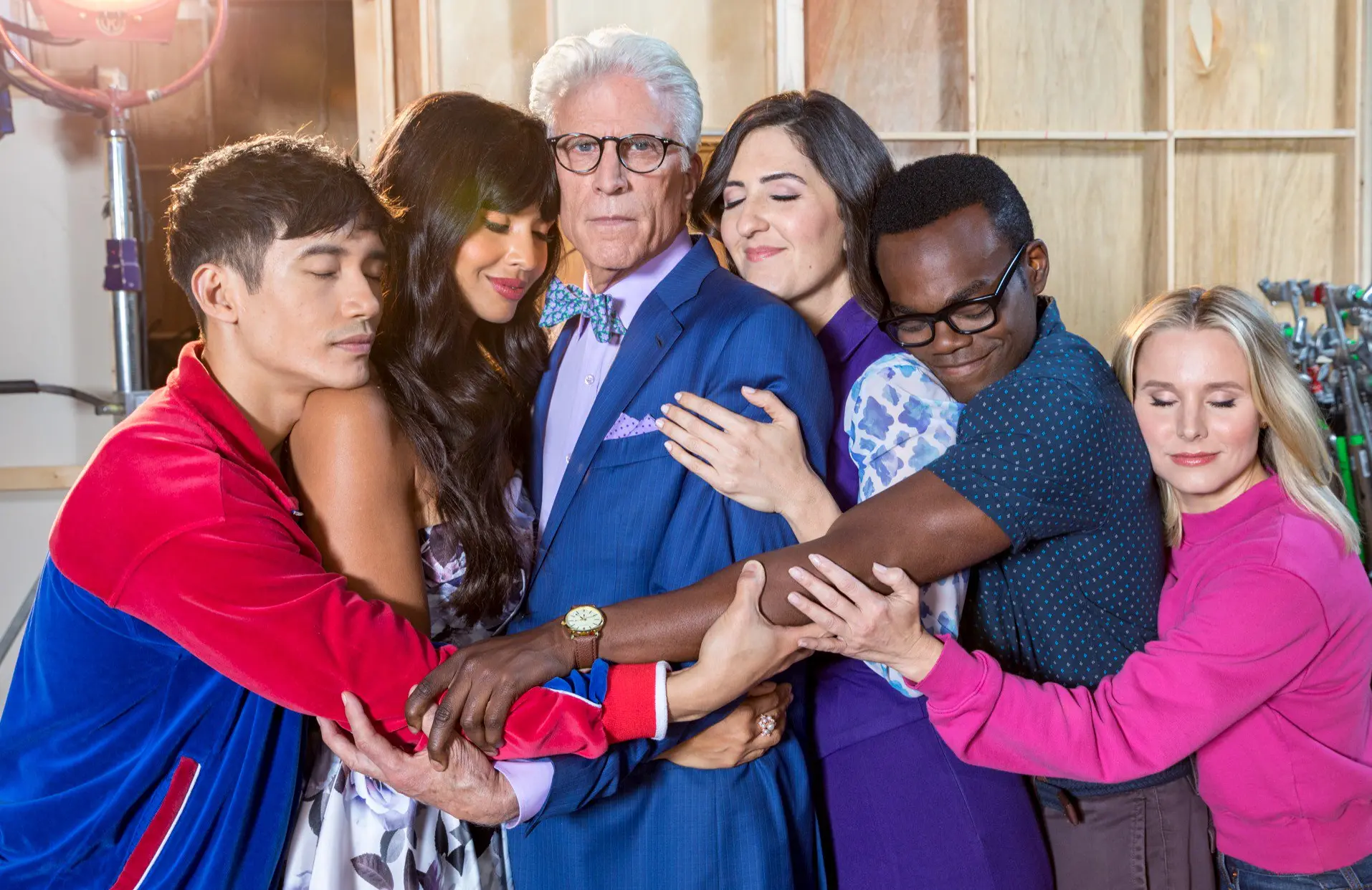Is The Good Place Network TV's Last Great Comedy Hit?
-
 The Good Place's Manny Jacinto, Jameela Jamil, Ted Danson, William Jackson Harper, and Kristen Bell (NBC)
The Good Place's Manny Jacinto, Jameela Jamil, Ted Danson, William Jackson Harper, and Kristen Bell (NBC)It’s a rough time to be a network sitcom. Now that The Big Bang Theory has banged its last big, there really isn't a genuine hit comedy left on five broadcast networks. You have your underappreciated gems, like Superstore and Mom. You have your long-running stalwarts, like Modern Family and Black-ish. And you have your new challengers -- shows like Mixed-ish and Carol’s Second Act -- hoping to make noise in a space that has largely gone quiet, even for the most successful shows.
If they want to truly transcend as hits, however, they’d be wise to look at The Good Place. Like creator Mike Schur’s NBC shows before it, The Office and Parks & Recreation, The Good Place has blown past mere ratings success to become a cultural phenomenon. Its choice to end after its fourth season has been mourned far and wide, including in our own forums, where each episode of the past three seasons has inspired frenzied debate.
What is it about The Good Place that has made it such a genuine, organic hit on a broadcast network in this day and age? And how can other shows replicate its success?
To me, it comes down to three things. First, there’s the spoiler-heavy nature of the show. The Good Place has developed a reputation for big twists ever since Season 1’s finale, when it's revealed (and I guess this is itself a spoiler, although if you’ve avoided it for this long I’m in awe of your life) that the titular “Good Place,” aka Heaven, is actually a new form of the Bad Place, aka Hell. Since then, the series has consistently upended its own premise, vacillating wildly from plot point to plot point in a way that could feel chaotic in lesser hands, but instead feels remarkably assured.
To miss an episode of The Good Place the day it airs is to open yourself up to a free-for-all of twist details. Literally any episode could be one that totally changes the game. In many ways, The Good Place is the comedic variant of Scandal: Must-See TV for the social media era.
But a lot of The Good Place’s latter success came from hooking people after that first-season twist. This is where the ultra-wise decision to put the first season on Netflix comes in to play. Like other network and cable shows that have built audiences on streaming after their initial premiere — both Breaking Bad and Riverdale come to mind — The Good Place was able to leverage streaming to its own benefit. Instead of being drowned out by the prestige shows on streaming services, The Good Place built its audience there and took them back with them to NBC.
I’m writing this on the morning of NBC’s announcement that nearly the entire NBC/Universal library will be moving to its own new streaming service called Peacock. Nearly every major network has a place on a non-Netflix streaming service now, between Disney+, CBS All Access and Hulu. Perhaps this will work for them, but it’s tough to imagine The Good Place being the hit it is today if Season 1 had gone to Peacock instead of Netflix.
The final factor in The Good Place’s success, and the one I think more network shows need to focus on, is the actual content. Infusing fairly complex ideas of philosophy (at least, for a network sitcom) into a familiar format elevated The Good Place, making it something truly remarkable on TV. Being unique — and, it should be stressed, actually being good — are big pluses when the market is increasingly saturated with more and more shows. On the surface, some of this fall’s sitcoms would seem to be remarkably pedestrian. Not to pick on Carol’s Second Act, but “middle-aged woman becomes medical intern” is the kind of lazy premise that seems destined to not stand out.
The Good Place had something of a perfect storm informing its success. If even one of these things had fallen through — if the quality had dropped off, if the show never hit Netflix, or if the twists didn’t land with the audience — it’s likely it would have become a two-season series we lament for being canceled too soon. But in its legacy, it leaves a recipe for success for future network comedies. There is hope for other shows: let The Good Place show you the way.
NBC airs The Paley Center Salutes The Good Place at 8pm on Thursday Sept. 19, one week before the show's fourth and final season premiere.
People are talking about The Good Place in our forums. Join the conversation.
Kevin O'Keeffe is a writer, host, and RuPaul's Drag Race herstorian living in Los Angeles.
TOPICS: The Good Place, NBC, The Paley Center